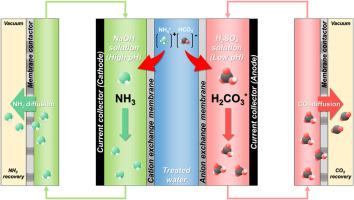Development of a flow-voltaic acid/base electrodialysis system for ammonia recovery with selective gas stripping in carbon capture, utilization & storage processes
IF 10
1区 环境科学与生态学
Q1 ENGINEERING, ENVIRONMENTAL
引用次数: 0
Abstract
The urgent need to address climate change underscores the necessity for advancements in carbon capture, utilization & storage (CCUS) technologies. Traditional CCUS processes predominantly depend on chemical- and energy-intensive operations. This paper introduces the flow-voltaic acid/base electrodialysis (FVED) process, a pioneering advancement engineered to optimize the sustainability and efficiency of CCUS processes. By integrating electrochemical ion and gas separation technologies, this study minimized the reliance on chemical dosing and significantly reduced energy consumption. The electrical conductivity and deionization performance of the FVED were evaluated based on applied voltage and acid/base concentrations. Membrane contactor applicability was evaluated by investigating the membrane damage after prolonged exposure to high concentrations of an acid/base solution. The membrane contactor enhanced the deionization performance during the FVED stage, preventing the reverse diffusion of CO2 and NH3. Efficient operating suggestions were derived from experimental and theoretical analyses. Additionally, the FVED process demonstrated a reduction in energy requirements of up to 54 % during the CO2 and NH3 recovery processes compared with traditional methods. In conclusion, the FVED system represents an important technological advancement in the CCUS field. Because of its enhanced efficiency, reduced chemical dependency, and low energy requirements, the FVED system offers a robust solution to the pressing global challenge of climate change mitigation. The development and implementation of innovative technologies are critical for the global pursuit of carbon neutrality and sustainable industrial practices.


在碳捕集、利用和封存过程中,用于氨回收的选择性气提流动-光伏酸碱电渗析系统的开发
应对气候变化的迫切需要凸显了在碳捕获、利用和排放方面取得进展的必要性。存储(CCUS)技术。传统的CCUS工艺主要依赖于化学和能源密集型操作。本文介绍了流动伏打酸/碱电渗析(FVED)工艺,这是一项开创性的进步,旨在优化CCUS工艺的可持续性和效率。通过集成电化学离子和气体分离技术,本研究最大限度地减少了对化学加药的依赖,并显著降低了能耗。根据施加电压和酸碱浓度对FVED的电导率和去离子性能进行了评价。通过研究长期暴露于高浓度酸/碱溶液后的膜损伤情况,评估了膜接触器的适用性。膜接触器增强了FVED阶段的去离子性能,阻止了CO2和NH3的反向扩散。通过实验和理论分析,得出了有效的操作建议。此外,与传统方法相比,FVED工艺在CO2和NH3回收过程中减少了高达54%的能源需求。综上所述,FVED系统代表了CCUS领域的重要技术进步。由于其提高效率、减少化学依赖和低能源需求,FVED系统为缓解气候变化这一紧迫的全球挑战提供了一个强大的解决方案。创新技术的开发和实施对于全球追求碳中和和可持续工业实践至关重要。
本文章由计算机程序翻译,如有差异,请以英文原文为准。
求助全文
约1分钟内获得全文
求助全文
来源期刊

Journal of Cleaner Production
环境科学-工程:环境
CiteScore
20.40
自引率
9.00%
发文量
4720
审稿时长
111 days
期刊介绍:
The Journal of Cleaner Production is an international, transdisciplinary journal that addresses and discusses theoretical and practical Cleaner Production, Environmental, and Sustainability issues. It aims to help societies become more sustainable by focusing on the concept of 'Cleaner Production', which aims at preventing waste production and increasing efficiencies in energy, water, resources, and human capital use. The journal serves as a platform for corporations, governments, education institutions, regions, and societies to engage in discussions and research related to Cleaner Production, environmental, and sustainability practices.
 求助内容:
求助内容: 应助结果提醒方式:
应助结果提醒方式:


